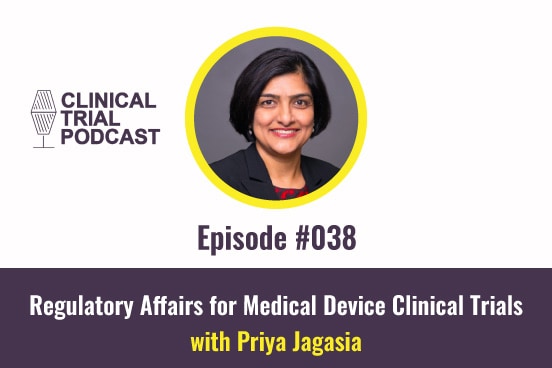Clinical trials are conducted in compliance with regulations.
Simply stated, you need a clinical and regulatory strategy when it comes to conduct of clinical trials for medical devices.
As a clinical researcher, there have been times I’ve felt lost because I did not understand the regulatory framework.
To close this knowledge gap, I thought it would be great to invite Priya Jagasia, Divisional Vice President (DVP) of Regulatory Affairs at Abbott Vascular on the show.
In this episode, Priya shares with us her experience and knowledge on regulatory affairs, specifically focused around medical device regulations in the United States.
She does a great job of tailoring our conversation to make it applicable for clinical trial professionals.
We cover topics such as working with the FDA, partnership between regulatory affairs and clinical research, career and professional development, and much more.
The art and science of regulatory affairs is fascinating and there is no better person on the planet who can educate us on this topic.
Please join me in welcoming Priya Jagasia on the Clinical Trial Podcast.
Sponsor
Florence Healthcare: Transform your Clinical Trials with the #1 Platform for Electronic Document Workflows and Remote Site Access.
Learn how Florence Healthcare helps over 7,200 research sites, sponsors, and CROs across 27 countries take their day back from paper
Show Notes
[3:42] How Priya got started her career at an analytical lab that led to opportunities in Quality Control (QC), Quality Assurance (QA), and Regulatory Affairs (RA)
[5:26] Negotiating with regulators and exercising influence
[6:18] Difference between Regulatory Affairs (RA), Clinical Research (Clinical Affairs), Medical Affairs, and Quality Assurance (QA)
[8:09] Regulatory Affairs is involved all the way from the beginning, in terms of development of the product, to reviewing reports and protocols, to finally making the submission. RA brings an assessment of risk and strategy throughout the development process
[9:16] Clinical data requirements for 510K submissions and fundamentals of 510K device i.e. substantial equivalence devices
- Little or no interaction with the patient
- Product has been approved in another country
[11:18] Preparing for an FDA pre-submission meeting
- Start with what questions you want to ask the FDA
- Start building other peripheral materials around your question and how to build you case (back-up slides)
- Have independent Subject Matter Experts (SMEs), medical affairs, and/or consultants look at your material as they may give you unique perspective
[15:07] Finding and selecting regulatory consultants including independent reviewers
[18:23] Partnership between clinical research and regulatory affairs
- Forum to discuss ideas (pre-subs, indications, clinical regulations including draft guidance)
[20:40] Being transparent and prepared when meeting with the FDA. FDA is collaborative partner and not a hurdle
[22:27] FDA panel meetings are pathway for supporting decision making when there questions about safety and effectiveness
[25:31] Preparing for a panel meeting
[26:27] Competitive strategy and medical device classification
[28:23] Regulatory person’s role is to take the least burdensome approach based risk-benefit profile of the medical device
[29:54] Partnership between clinical and regulatory affairs on an Investigational Device Exemption (IDE) submission and doing the research to make sure that the submission has the least amount of risk and the highest possibility for approval
- Does the clinical trial design meet the regulatory requirements?
- Is there appropriate blinding in place?
- Is that appropriate monitoring in place?
- Are we collecting data on sufficient patients in the country that you’re seeking approval in?
- Are you having the right endpoints, similar to what FDA has either recommended or other agencies have recommended?
[31:43] What it takes to advance your career in regulatory affairs?
- Know your therapy and understand the competition
- Critical thinking and negotiation skills
- Being on top of emerging regulations and engaging with your partners
- As a manager or leader, you need to help your team build the above skills
[34:01] Key Performance Indicators (KPIs)
- Tracking on time approvals
- Being proactive with new regulations
- Being strategic using the least burdensome approach
[35:04] Regulatory affair specialist role
- Getting familiar with product and therapy
- Building knowledge on submission writing
- Submissions such as annual reports and changes
[36:51] Training plan for regulatory affairs
- Courses
- On-job experience
[38:26] Why Priya loves to work with/ hire individuals with scientific, clinical backgrounds, medical or nursing backgrounds for regulatory affairs position







